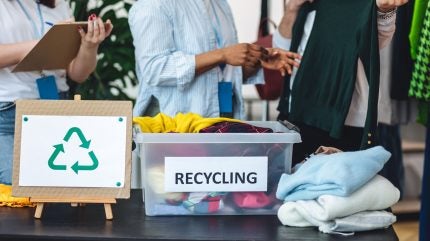
Scheduled for release on 22 September 2025, Rehubs’ action plan introduces a series of projects intended to overcome the longstanding supply-demand impasse hindering advancements in circular textiles.
The strategy formulation involved over 100 interviews and surveys with members of the ReHubs community as well as external industry stakeholders.

Discover B2B Marketing That Performs
Combine business intelligence and editorial excellence to reach engaged professionals across 36 leading media platforms.
The plan rests on end-to-end supply chain management and financing orchestration pillars, ReHubs explained.
The first pillar aims to streamline the collection, sorting, recycling, and manufacturing processes to ensure a consistent supply of recycled fibres with transparent costs and quality.
The second pillar seeks to mobilise and mitigate the risks associated with the €5bn ($5.84bn) to €6bn investment required to expand infrastructure.
This financial effort will be supported by brand commitments alongside private and public funding, stated ReHubs.

US Tariffs are shifting - will you react or anticipate?
Don’t let policy changes catch you off guard. Stay proactive with real-time data and expert analysis.
By GlobalDataThe company said six strategic levers will underpin the two pillars to expedite progress through harmonisation of industry standards, targeted research, policy advocacy, finance and investment mobilisation, and the construction of brand coalitions.
These levers are expected to secure a reliable feedstock supply, establish clear standards, enhance collaboration, and boost confidence in recycled textiles as a viable and scalable solution.
ReHubs chairman Alain Poincheval said: “This is a defining decade for Europe’s textile industry. Circularity is no longer just a vision, it is an urgent infrastructure challenge. With ReHubs’ new strategy, we will lead the industry with the clarity, coordination, and collective strength needed to turn waste into value, resilience, and competitive advantage.”
ReHubs has set forth goals with this initiative that include:
- To recycle 2.5m tonnes of textile waste by 2032, which would account for approximately 35-40% of Europe’s annual textile waste
- To unlock €5bn-6bn in investments while potentially creating up to 10,000 new jobs across Europe
- To position Europe as a global frontrunner in circular textiles through scalable and demand-driven recycling solutions.
ReHubs CEO Robert van de Kerkhof said: “ReHubs’ new strategy is designed to move from isolated initiatives to coordinated industry-wide implementation and ecosystem transformation. By combining stakeholder collaboration with direct action on infrastructure, finance, and policy, we can scale textile-to-textile recycling and turn Europe’s waste challenge into an opportunity.”
ReHubs will also disseminate insights from its new strategy at industry events such as the Dornbirn Global Fibre Congress and Circular Textile Days.
These platforms will serve as invitations for wider industry engagement in cultivating a truly circular textile ecosystem within Europe.





